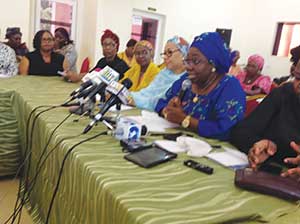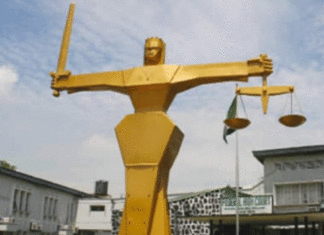In-coming Muhammadu Buhari administration gets a sign of what lies ahead, as women agenda for it, Assistant Editor (North) CHUKS EHIRIM, reports.
Even as he is yet to assume office, President-elect, Muhammadu Buhari, is already being tasked by women political activists on his campaign promises. This is especially in relation to the 35 per cent Beijing agreement on affirmative action for women on political appointments.

The agitation began to take shape shortly after the All Progressives Congress (APC) made public the list of its Transition Committee, which contained the names of only two women. Some of the women who spoke to TheNiche on the issue then complained that the list fell short of their expectation.
In what seemed a follow-up, last Monday in Abuja, a coalition of over 15women non-governmental organisations (NGOs) expressed their apprehension that the Buhari administration may not carry them along in governing the country for the next four years.
The NGOs at the occasion were: Women in Politics Forum (WIPF), Women Rights Advancement and Protection Alternative (WRAPA), Federation of International Women Lawyers (FIDA),100 Women Lobby Group, Equity Advocates, National Association of Women Journalists (NAWOJ), and Omowumi Asubiaro-Dada Aisha Osori Women Advocate Research and Documentation Centre (WARDC).
Others are: Centre for Democracy and Development (CDD), Women Foundation of Nigeria (WFN), Nigerian Women Trust Fund (NWTF), Proactive Gender Initiative (PGI), Civil Resource Development and Documentation Centre (CIRDDOC) and Women Consortium of Nigeria (WOCON).
Convener of the event and WIPF president, Ebere Ifendu, who spoke at the occasion, congratulated the president-elect, and his party, the APC, on their victory at the general election, lamenting, however, that Buhari has not kept the promise he made to the Nigerian women before the elections.
She stressed that the forum was organised to bring to the attention of the in-coming APC administration the obligation of the country to the Nigerian women as far as international conventions and treaties are concerned and to remind it of its commitments during the 2015 general election campaigns with regards to gender equity.
She recalled that on March 19, 2015, Buhari in a keynote address at a town hall meeting with professional women in Lagos stated APC government under his leadership is committed to ensuring that gender is mainstreamed throughout all the government’s commitments in key areas such as the economy, education, health, security, good governance, power, agriculture and other areas of national development.
The president-elect, she added, pledged implementation of the 2005 National Gender Policy, which serves as a roadmap for the promotion of women’s empowerment and gender equality in Nigeria, stressing that so far, there has been no political will to implement this very critical framework.
Buhari, she also said, had promised promotion of anti-discrimination legislations and policies to afford women equality and equity, especially in employment, education, housing and entrepreneurship.
According to Ifendu, the president-elect had assured women that in APC-led government, there would be strong political will to promote women’s empowerment and gender equality through dedicating the required financial commitment.
She quoted Buhari to have said: “My administration will have zero tolerance for violence against women and girls. We will provide women with greater legal protection from all forms of violence and sexual harassment and there will be a commitment to the implementation of all legislation on violence against women.
“We will improve and strengthen support for women in all sectors of the economy, through access to capital, training and skills acquisition. We will also ensure that women have better access to capital and credit facilities for their businesses.”
Ifendu had expressed satisfaction at the Buhari agenda for the women, adding that they were in line with internationally observed standards and practices for work towards gender equity.
She said that The Beijing +20 Platform for Action enjoins governments of the world to increase the percentage of women in decision-making, thereby providing equal opportunities for women and men at all levels of governance, including ministries, departments, agencies and boards.
Nigeria, she recalled, is a signatory to the Convention on the Elimination of All Forms of Discrimination Against Women (CEDAW). Article 7 of the Convention requires member states to “take all appropriate measures to eliminate discrimination against women in the political and public life of the country and, in particular, shall ensure to women, on equal terms with men, the right: (b) to participate in the formulation of government policy and the implementation thereof and to hold public office and perform all public functions at all levels of government”.
She drew the attention of the in-coming administration to the statistics published by the Inter-Parliamentary Union last April. In it, Nigeria was ranked second last in Africa and at 132nd out of 190 countries that submitted data on percentage of women in parliament.
“It should be noted that Rwanda, Senegal, South Africa and Namibia are in the top 10 countries. We would like to draw the link between women’s presence in parliament and government, on one hand, and the level of social, political and economic development of a nation, on the other. The inclusion of women and men’s perspective and experience into the decision-making process will inevitably lead to solutions that are more viable and satisfy a broader range of society – the case of Scandinavian countries,” Ifendu noted.
The women activists thus tabled a list of areas the Buhari administration must focus its attention on if it must win their support.
They particularly urged the government to “ensure that gender parity is observed in the implementation of the federal character law”. According to them, in implementing the Nigeria Gender Policy, attention should be paid to integrity; intellectual capacity; credibility, administrative competency and antecedents of the appointees.
They also seek appointment of women in key positions not being tied to party affiliation, but targeting women with proven competence in their various fields of endeavour.
The government, according to the women, must “make concerted effort to improve the number of women in the executive and public service to make up for the low ranking of the Nigeria’s legislature in terms of women representation”.
It was also asked to “support and encourage the election and/or selection of women to principal and leadership positions in the national and state assemblies.
As if he had known that the women would soon embark on advocacy for gender parity in his government, Buhari had pleaded for understanding from the womenfolk earlier last week, when his team played host to women leaders of his party who visited him at the Defence House in Abuja.
Speaking at that occasion, Buhari made it clear that his government should not be judged until it comes on stream.
“I have listened to the marathon speech by the national women leader. I believe that the success of the APC will be associated with her. I am happy that you recalled that the first opportunity I had to lead this country under a different system, there was a policy by the federal government that at every level of government, there must be at least one woman in government.
“I have heard the complaints of the women leader that they were not adequately represented in the transition committee. Noted. But I believe that there are a couple of women in the committees. I don’t know them personally and I did not ask them to be party-based. I think they are technocrats in their various fields. This was something that was done in a hurry and somebody had to look at the papers and you will be surprised that those who recommended them have never met some of them in person. That is how impartial we have tried to be. So please don’t start blaming me for marginalising you because I have not yet arrived until I am sworn in.”













